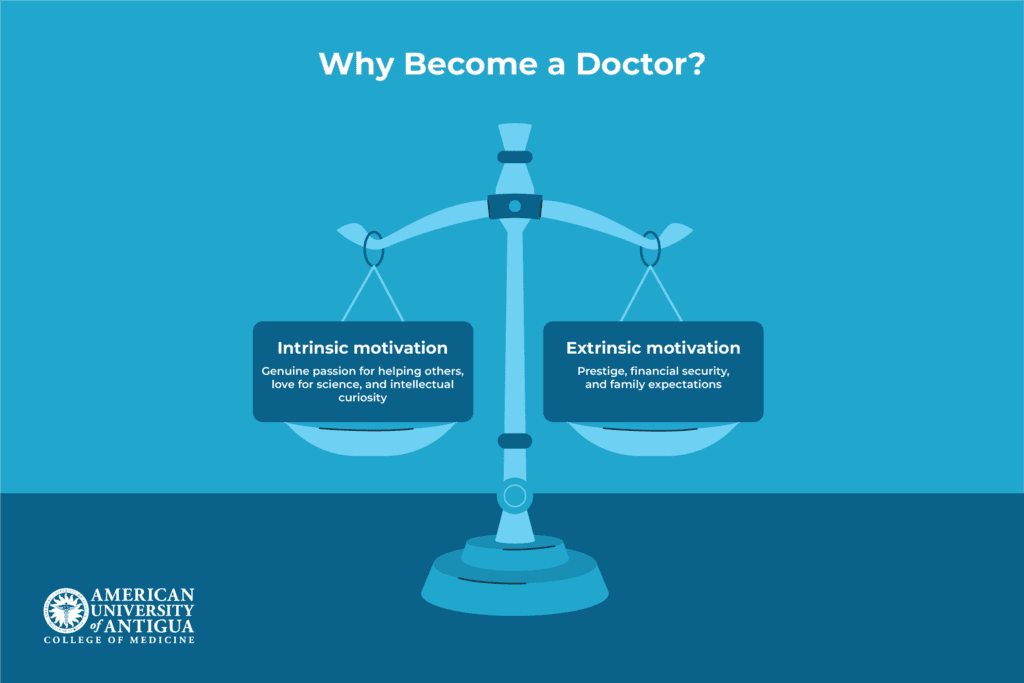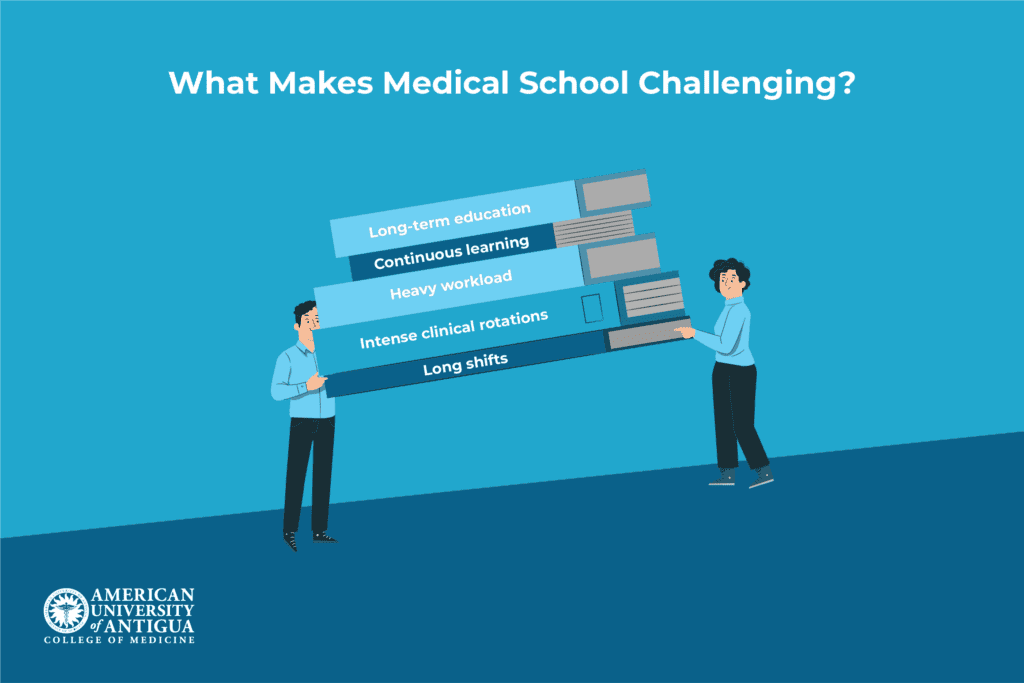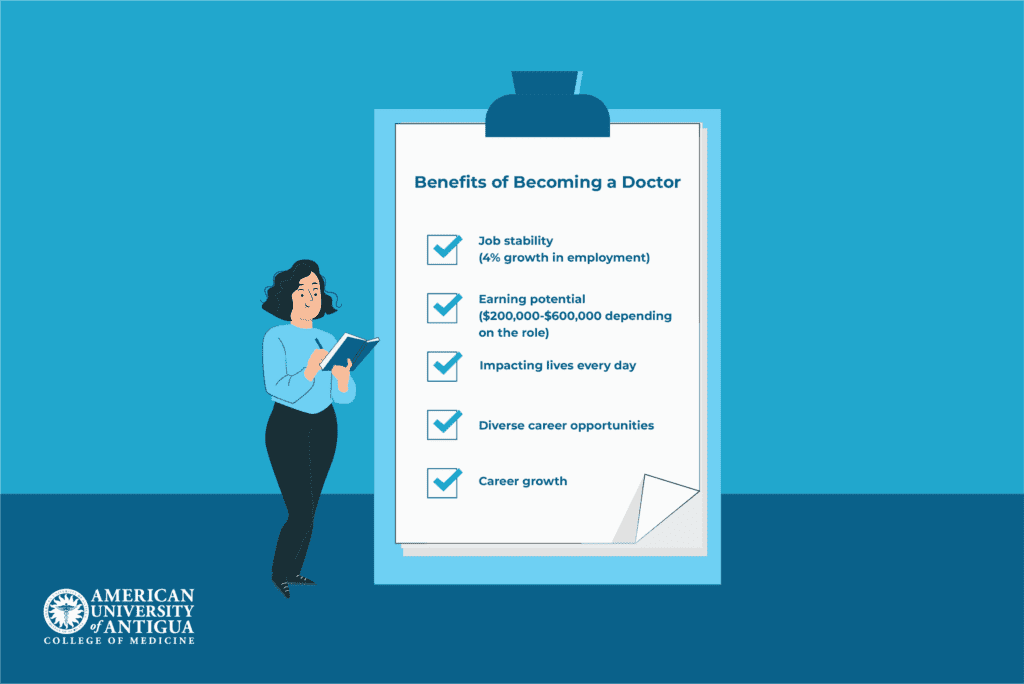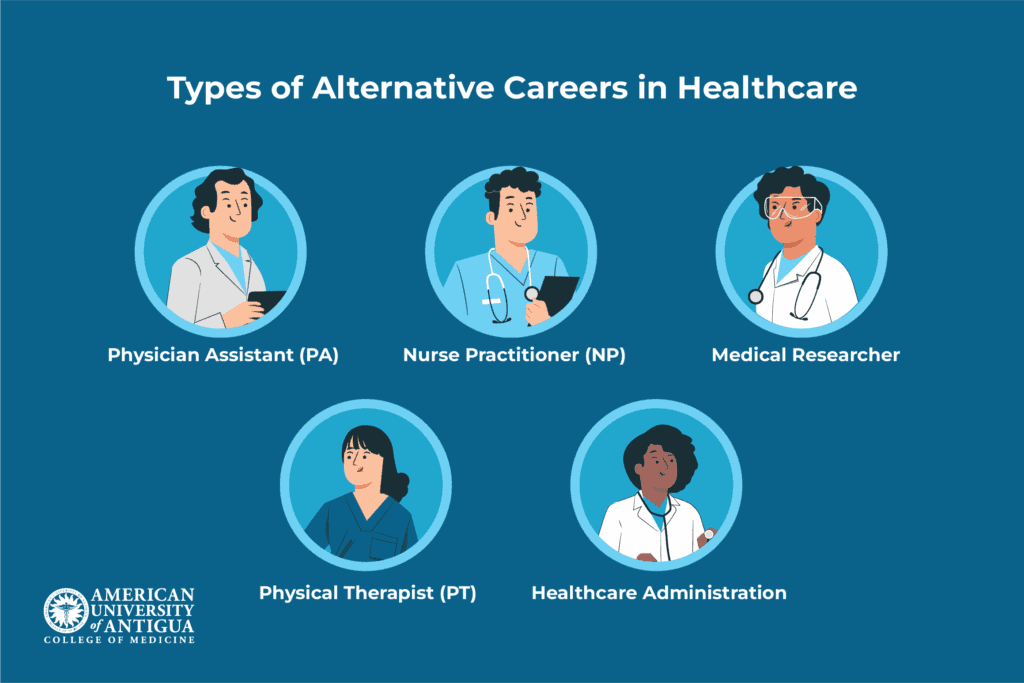Is Medical School Right for You? Key Questions to Ask
Key Takeaways
- Medical school is a major commitment, demanding years of intense study, emotional resilience, and financial investment.
- Thorough self-assessment before deciding to pursue a career in healthcare is crucial.
- Hands-on experience and mentorship are invaluable — shadowing doctors, volunteering, and engaging with medical professionals provide critical insights.
- When choosing a medical school, you should consider factors such as accreditation, clinical training, residency placements, and financial aid.
Deciding if medical school is right for you requires careful consideration and reflection. The journey is long, demanding, and expensive – but the rewards are unmatched for those who are truly passionate. A career in medicine offers job stability, financial security, and the opportunity to change lives, yet it also comes with high stress, years of education, and emotional challenges.
Before committing, take a step back to evaluate whether this path aligns with your strengths, goals, and lifestyle. Through self-reflection, hands-on experience, and expert advice, you can determine whether medical school is the right fit.
✅ Request information on AUA's MD program TODAY!
Key Questions to Ask Yourself to Know if Medical School Is Right for You
Before diving into medical school, take a step back. This path demands years of rigorous study, resilience, and a deep commitment to patient care. Is it truly right for you? Ask yourself key questions about your motivation, lifestyle fit, and long-term goals. Let’s break it down to help you decide wisely.
Why do you want to become a doctor?

Your motivation for becoming a doctor is everything – it will push you through long nights of studying, exhausting shifts, and emotional challenges.
There are two types of motivation: intrinsic (genuine passion for helping others, love for science, and intellectual curiosity) and extrinsic (prestige, financial security, and family expectations). While extrinsic factors can play a role, they shouldn’t be the driving force. Medicine is too demanding to pursue solely for status or a paycheck.
A physician’s daily life isn’t all dramatic life-saving moments; it also includes paperwork, complex patient interactions, and years of continuous learning. If you’re drawn to problem-solving, lifelong education, and making a direct impact on people’s well-being, that’s a strong sign this career is for you. But if external pressures are your main driver, reconsider before committing.
Do you have what it takes to get accepted into medical school?
Getting into medical school isn’t easy. It requires strong academics, a solid MCAT score, and well-rounded extracurriculars. Most schools look for a good GPA (especially in science courses), competitive MCAT results, and hands-on experience like shadowing, research, and community service.
Take an honest look at your qualifications. Are your grades and test scores competitive? Have you gained meaningful clinical exposure? Do your activities demonstrate leadership, commitment, and a passion for medicine?
If you’re unsure where you stand, compare your stats to the average accepted student at your target schools. Consider talking to an advisor or mentor. If your application needs improvement, you may need additional coursework, more experience, or even a post-baccalaureate program. Be realistic – medical school is tough, and getting in is just the first challenge.
Are you prepared for the academic challenge?
Medical school is academically intense, starting with the demanding pre-med years. Courses like organic chemistry, biology, and physics push students to their limits. Once in med school, the workload only increases – endless memorization, complex problem-solving, and high-pressure exams become the norm.
Common struggles include information overload, burnout, and time management issues. However, successful students adapt by developing strong study habits, using active learning techniques, and staying disciplined. They also embrace intellectual curiosity, because medicine isn’t just about memorizing facts – it’s about understanding and applying knowledge.
Ask yourself: Do I enjoy learning, even under pressure? Am I willing to sacrifice free time for studying? If you struggle with self-discipline or get overwhelmed easily, this path may be more challenging than you expect.
Can you handle the emotional and mental strain?
Being a doctor requires more than intelligence – it demands emotional resilience. You’ll face long hours, life-and-death decisions, and patients who don’t always recover. Witnessing suffering and delivering bad news can take a serious toll, and burnout is common in the medical field.
To succeed, you need strong coping mechanisms. Effective stress management, a reliable support system, and mental resilience are essential. Many doctors stay grounded through exercise, hobbies, therapy, or close relationships.
Ask yourself: Can I handle high-pressure situations without breaking down? Am I comfortable making tough decisions? Do I have strategies for managing stress? If you struggle with emotional regulation or already feel overwhelmed by academic pressure, the demands might be more than you’re prepared for.
Are you comfortable with long-term commitment?

Becoming a doctor is a long commitment, often a decade or more of training. After four years of undergrad, you’ll spend another four in medical school, followed by three to seven years in residency. Some specialties require fellowships, adding even more years. However, it will all be worth it once you step foot into the hospital as a certified doctor, helping those in need.
This journey includes a heavy workload, sleepless nights, and intense clinical rotations. Residency means long shifts, sometimes 80+ hours a week, with little personal time. Even after becoming an attending physician, the learning never stops. Medicine evolves, and you must stay updated.
Ask yourself: Am I willing to dedicate my 20s (and beyond) to this path? Can I handle delayed gratification while my peers build careers and financial stability? If lifelong learning and delayed rewards don’t appeal to you, reconsider this path.
Are you financially ready?
Medical school is a huge financial investment. Tuition and fees alone can cost hundreds of thousands of dollars, and when you factor in living expenses, textbooks, and exam fees, the costs only rise. Most students rely on loans, which can take years, sometimes decades, to repay.
That said, there’s financial support out there to ease the burden. Financial aid and scholarships can help, but they’re competitive. Some loan repayment programs, like Public Service Loan Forgiveness (PSLF), offer relief for those working in certain fields.
At the American University of Antigua College of Medicine (AUACOM), students have access to scholarships ranging from $20,000-$100,000, financial aid, and payment plans to ease the financial burden.
Before committing, ask yourself: Am I prepared for this level of debt? Have I explored all financing options? If the cost of med school concerns you, research programs that fit your budget and consider institutions like AUACOM, which provide support to make your education affordable.
How to Decide if Medical School Is Right for You
Before deciding on medical school, use practical methods to gain clarity: self-assessment tools, conversations with medical professionals, and hands-on experience through shadowing or volunteering. These steps help you understand the realities of medicine and assess whether it’s the right fit for you.
Using self-assessment tools
Self-assessment tools help determine if a medical career aligns with your strengths, interests, and personality. Career quizzes like the AAMC’s Medical School Readiness Tool, the MAPP Career Test, or the Myers-Briggs Type Indicator (MBTI) offer insights into your suitability for medicine.
These tools evaluate critical thinking, empathy, resilience, and problem-solving skills — key traits for doctors. They also highlight areas for improvement, such as time management or stress tolerance, helping you identify what to work on before committing.
While no quiz can make the decision for you, these assessments provide valuable reflection points.
Talking to medical professionals
Speaking with medical professionals offers real-world insights that no textbook or quiz can provide. Shadowing doctors in hospitals or clinics lets you observe their daily routines, patient interactions, and challenges firsthand.
Networking with medical students is equally valuable. They can share honest perspectives on coursework, stress levels, and what they wish they had known before applying. Seeking mentorship from physicians, professors, or healthcare professionals can also guide your decision, offering advice tailored to your strengths and concerns.
These conversations help you move beyond the idealized image of medicine and understand the sacrifices, rewards, and lifestyle demands.
Gaining hands-on experience
Clinical experience helps you understand the realities of patient care, the healthcare environment, and whether you enjoy the day-to-day challenges of the field. There are several ways to gain experience:
- Volunteering: Allows you to interact with patients and observe medical teams in action.
- Working as a medical scribe: Provides insight into clinical decision-making while improving your medical knowledge.
- Participating in research: Helps you develop analytical skills and exposes you to medical advancements.
These experiences can either confirm your passion for medicine or reveal that another healthcare career might be a better fit. The more exposure you get, the more informed your decision will be.
The Long-Term Benefits of a Medical Career

A medical career is challenging, but its long-term rewards make the journey worthwhile, such as:
- Job stability: The demand for doctors remains high. The U.S. Bureau of Labor Statistics projects a 4% growth in physician jobs over the next decade, ensuring strong job security.
- Earning potential: While salaries vary, even lower-paying specialties, like pediatrics (around $200,000/year), offer solid income. Higher-paying fields, like neurosurgery ($600,000+/year), can be incredibly lucrative.
- Making a difference: Few careers allow for such a direct, positive impact on people’s lives. Doctors save lives, improve health, and bring comfort to patients.
- Diverse specialties: From surgery to psychiatry, there’s a specialty for every interest, allowing flexibility and career customization.
- Career growth: Medicine offers endless learning opportunities, leadership roles, and pathways into research, education, or administration.
If you’re looking for a career with stability, financial security, and the chance to make a real difference, medicine offers all that and more.
Alternative Careers in Healthcare

If you’re passionate about healthcare but hesitant about medical school, there are plenty of rewarding alternatives that require less time and financial commitment, including:
- Physician Assistant (PA): They diagnose and treat patients under a doctor’s supervision, with a shorter educational path (about 2-3 years after undergrad).
- Nurse Practitioner (NP): They provide primary and specialized care, often independently, with a master’s or doctoral degree in nursing.
- Medical Researcher: If you love science, consider a career in biomedical research, drug development, or epidemiology.
- Physical Therapist (PT): They help patients recover from injuries and improve mobility. A Doctor of Physical Therapy (DPT) degree takes around three years to complete.
- Healthcare Administration: If you’re interested in the business side of medicine, careers in hospital management, health policy, or medical consulting might be a great fit.
These careers still offer job stability and the ability to make a difference without the demanding path of medical school.
Conclusion
Choosing to pursue medical school is a major decision that requires deep reflection. Consider your motivation, academic readiness, emotional resilience, and long-term commitment. Gain hands-on experience, talk to professionals, and use self-assessment tools to ensure this path aligns with your goals.
A career in medicine has numerous rewards, such as job stability, high earning potential, and opportunities for career growth. However, if you have doubts, explore alternative healthcare careers that still allow you to make a meaningful impact.
AUACOM provides excellent programs, including the MD program, financial aid, and hands-on training. If you’ve already decided to pursue a medical career, take the first step and apply at our school now!
Frequently Asked Questions
Is it worth it to go to med school?
If you’re passionate about medicine, willing to commit years to education, and ready for the emotional and financial challenges, then yes — medicine offers job stability, high earning potential, and the chance to make a real impact.
How to know which medical school is right for you?
Look for strong academics, clinical training opportunities, residency match rates, financial aid options, and a supportive learning environment that aligns with your goals.
What are the most important considerations when choosing a medical school?
Accreditation, curriculum, location, tuition costs, student support services, clinical rotations, and residency placements should be top priorities when choosing a medical school.
✅ Request information on AUA's MD program TODAY!